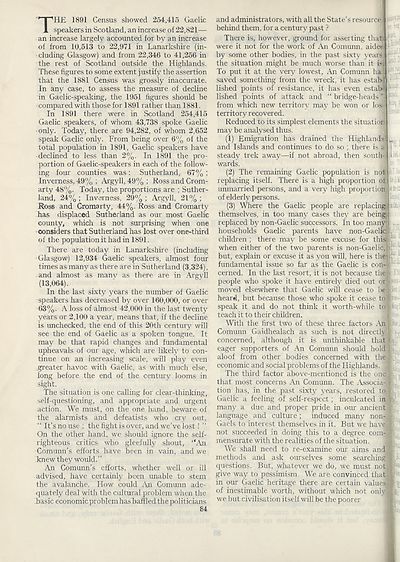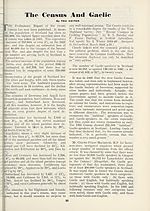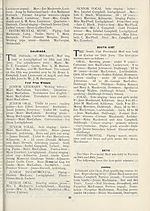An Comunn Gàidhealach Publications > Gaidheal > Volumes 46--48, January 1951--December 1953
(150) Page 84
Download files
Complete book:
Individual page:
Thumbnail gallery: Grid view | List view

THE 1891 Census showed 254,415 Gaelic
speakers in Scotland, an increase of 22,821—
an increase largely accounted for by an increase
of from 10,513 to 22,971 in Lanarkshire (in¬
cluding Glasgow) and from 22,346 to 41,256 in
the rest of Scotland outside the Highlands.
These figures to some extent justify the assertion
that the 1881 Census was grossly inaccurate.
In any case, to assess the measure of decline
in Gaelic-speaking, the 1951 figures should be
compared with those for 1891 rather than 1881.
In 1891 there were in Scotland 254,415
Gaelic speakers, of whom 43,738 spoke Gaelic
only. Today, there are 94,282, of whom 2,652
speak Gaelic only. From being over 6% of the
total population in 1891, Gaelic speakers have
declined to less than 2%. In 1891 the pro¬
portion of Gaelic-speakers in each of the follow¬
ing four counties was: Sutherland, 67% ;
Inverness, 49% ; Argyll, 49% ; Ross and Crom¬
arty 48%. Today, the proportions are ; Suther¬
land, 24% ; Inverness, 29% ; Argyll, 21% ;
Ross and Cromarty, 44%. Ross and Cromarty
has displaced Sutherland as our most Gaelic
county, which is not surprising when one
considers that Sutherland has lost over one-third
of the population it had in 1891.
There are today in Lanarkshire (including
Glasgow) 12,934 Gaelic speakers, almost four
times as many as there are in Sutherland (3,324),
and almost as many as there are in Argyll
(13,064).
In the last sixty years the number of Gaelic
speakers has decreased by over 160,000, or over
63%. A loss of almost 42,000 in the last twenty
years or 2,100 a year, means that, if the decline
is unchecked, the end of this 20th century will
see the end of Gaelic as a spoken tongue. It
may be that rapid changes and fundamental
upheavals of our age, which are likely to con¬
tinue on an increasing scale, will play even
greater havoc with Gaelic, as with much else,
long before the end of the century looms in
sight.
The situation is one calling for clear-thinking,
self-questioning, and appropriate and urgent
action. We must, on the one hand, beware of
the alarmists and defeatists who cry out,
“ It’s no use ; the fight is over, and we’ve lost ! ”
On the other hand, we should ignore the self-
righteous critics who gleefully shout, “An
Comunn’s efforts have been in vain, and we
knew they would.”
An Comunn’s efforts, whether well or ill
advised, have certainly been unable to stem
the avalanche. How could An Comunn ade¬
quately deal with the cultural problem when the
basic economic problem has baffled the politicians
84
and administrators, with all the State’s resource
behind them, for a century past ?
There is, however, ground for asserting that
were it not for the work of An Comunn, aide?
by some other bodies, in the past sixty years)
the situation might be much worse than it is
To put it at the very lowest, An Comunn hai
saved something from the wreck, it has estaF
lished points of resistance, it has even estal>|
lished points of attack and “ bridge-heads ’’
from which new territory may be won or los|
territory recovered.
Reduced to its simplest elements the situath
may be analysed thus.
(1) Emigration has drained the Highland*
and Islands and continues to do so ; there is
steady trek away—if not abroad, then sout]
wards.
(2) The remaining Gaelic population is no1
replacing itself. There is a high proportion oj
unmarried persons, and a very high proportion!
of elderly persons.
(3) Where the Gaelic people are replacingj|
themselves, in too many cases the}- are being)
replaced by non-Gaelic successors. In too manyn
households Gaelic parents have non-Gaeliq
children ; there may be some excuse for this|
when either of the two parents is non-Gaelic,| :
but, explain or excuse it as you will, here is thefti
fundamental issue so far as the Gaelic is con¬
cerned. In the last resort, it is not because the
people who spoke it have entirely died out or
moved elsewhere that Gaelic will cease to be
heard, but because those who spoke it cease to
speak it and do not think it worth-while to
teach it to their children.
With the first two of these three factors An
Comunn Gaidhealach as such is not directl)!
concerned, although it is unthinkable that
eager supporters of An Comunn should hole*
aloof from other bodies concerned with th<
economic and social problems of the Highlands.
The third factor above-mentioned is the onej
that most concerns An Comunn. The Associa-|
tion has, in the past sixty years, restored t<
Gaelic a feeling of self-respect ; inculcated ii
many a due and proper pride in our ancient]
language and culture; induced many non-
Gaels to interest themselves in it. But we have
not succeeded in doing this to a degree com¬
mensurate with the realities of the situation.
We shall need to re-examine our aims andi
methods and ask ourselves some searching]
questions. But, whatever we do, we must not
give way to pessimism. We are convinced thal
in our Gaelic heritage there are certain value*
of inestimable worth, without which not onl;
we but civilisation itself will be the poorer
lies
nly
speakers in Scotland, an increase of 22,821—
an increase largely accounted for by an increase
of from 10,513 to 22,971 in Lanarkshire (in¬
cluding Glasgow) and from 22,346 to 41,256 in
the rest of Scotland outside the Highlands.
These figures to some extent justify the assertion
that the 1881 Census was grossly inaccurate.
In any case, to assess the measure of decline
in Gaelic-speaking, the 1951 figures should be
compared with those for 1891 rather than 1881.
In 1891 there were in Scotland 254,415
Gaelic speakers, of whom 43,738 spoke Gaelic
only. Today, there are 94,282, of whom 2,652
speak Gaelic only. From being over 6% of the
total population in 1891, Gaelic speakers have
declined to less than 2%. In 1891 the pro¬
portion of Gaelic-speakers in each of the follow¬
ing four counties was: Sutherland, 67% ;
Inverness, 49% ; Argyll, 49% ; Ross and Crom¬
arty 48%. Today, the proportions are ; Suther¬
land, 24% ; Inverness, 29% ; Argyll, 21% ;
Ross and Cromarty, 44%. Ross and Cromarty
has displaced Sutherland as our most Gaelic
county, which is not surprising when one
considers that Sutherland has lost over one-third
of the population it had in 1891.
There are today in Lanarkshire (including
Glasgow) 12,934 Gaelic speakers, almost four
times as many as there are in Sutherland (3,324),
and almost as many as there are in Argyll
(13,064).
In the last sixty years the number of Gaelic
speakers has decreased by over 160,000, or over
63%. A loss of almost 42,000 in the last twenty
years or 2,100 a year, means that, if the decline
is unchecked, the end of this 20th century will
see the end of Gaelic as a spoken tongue. It
may be that rapid changes and fundamental
upheavals of our age, which are likely to con¬
tinue on an increasing scale, will play even
greater havoc with Gaelic, as with much else,
long before the end of the century looms in
sight.
The situation is one calling for clear-thinking,
self-questioning, and appropriate and urgent
action. We must, on the one hand, beware of
the alarmists and defeatists who cry out,
“ It’s no use ; the fight is over, and we’ve lost ! ”
On the other hand, we should ignore the self-
righteous critics who gleefully shout, “An
Comunn’s efforts have been in vain, and we
knew they would.”
An Comunn’s efforts, whether well or ill
advised, have certainly been unable to stem
the avalanche. How could An Comunn ade¬
quately deal with the cultural problem when the
basic economic problem has baffled the politicians
84
and administrators, with all the State’s resource
behind them, for a century past ?
There is, however, ground for asserting that
were it not for the work of An Comunn, aide?
by some other bodies, in the past sixty years)
the situation might be much worse than it is
To put it at the very lowest, An Comunn hai
saved something from the wreck, it has estaF
lished points of resistance, it has even estal>|
lished points of attack and “ bridge-heads ’’
from which new territory may be won or los|
territory recovered.
Reduced to its simplest elements the situath
may be analysed thus.
(1) Emigration has drained the Highland*
and Islands and continues to do so ; there is
steady trek away—if not abroad, then sout]
wards.
(2) The remaining Gaelic population is no1
replacing itself. There is a high proportion oj
unmarried persons, and a very high proportion!
of elderly persons.
(3) Where the Gaelic people are replacingj|
themselves, in too many cases the}- are being)
replaced by non-Gaelic successors. In too manyn
households Gaelic parents have non-Gaeliq
children ; there may be some excuse for this|
when either of the two parents is non-Gaelic,| :
but, explain or excuse it as you will, here is thefti
fundamental issue so far as the Gaelic is con¬
cerned. In the last resort, it is not because the
people who spoke it have entirely died out or
moved elsewhere that Gaelic will cease to be
heard, but because those who spoke it cease to
speak it and do not think it worth-while to
teach it to their children.
With the first two of these three factors An
Comunn Gaidhealach as such is not directl)!
concerned, although it is unthinkable that
eager supporters of An Comunn should hole*
aloof from other bodies concerned with th<
economic and social problems of the Highlands.
The third factor above-mentioned is the onej
that most concerns An Comunn. The Associa-|
tion has, in the past sixty years, restored t<
Gaelic a feeling of self-respect ; inculcated ii
many a due and proper pride in our ancient]
language and culture; induced many non-
Gaels to interest themselves in it. But we have
not succeeded in doing this to a degree com¬
mensurate with the realities of the situation.
We shall need to re-examine our aims andi
methods and ask ourselves some searching]
questions. But, whatever we do, we must not
give way to pessimism. We are convinced thal
in our Gaelic heritage there are certain value*
of inestimable worth, without which not onl;
we but civilisation itself will be the poorer
lies
nly
Set display mode to:
![]() Universal Viewer |
Universal Viewer | ![]() Mirador |
Large image | Transcription
Mirador |
Large image | Transcription
| An Comunn Gàidhealach > An Comunn Gàidhealach Publications > Gaidheal > Volumes 46--48, January 1951--December 1953 > (150) Page 84 |
|---|
| Permanent URL | https://digital.nls.uk/127505473 |
|---|
| Description | This contains items published by An Comunn, which are not specifically Mòd-related. It includes journals, annual reports and corporate documents, policy statements, educational resources and published plays and literature. It is arranged alphabetically by title. |
|---|
| Description | A collection of over 400 items published by An Comunn Gàidhealach, the organisation which promotes Gaelic language and culture and organises the Royal National Mòd. Dating from 1891 up to the present day, the collection includes journals and newspapers, annual reports, educational materials, national Mòd programmes, published Mòd literature and music. |
|---|---|
| Additional NLS resources: |
|

